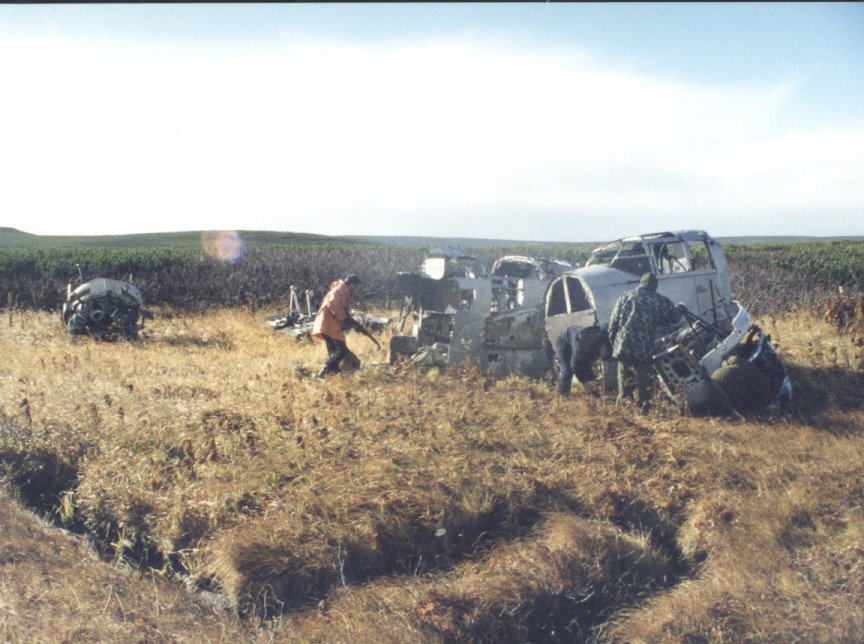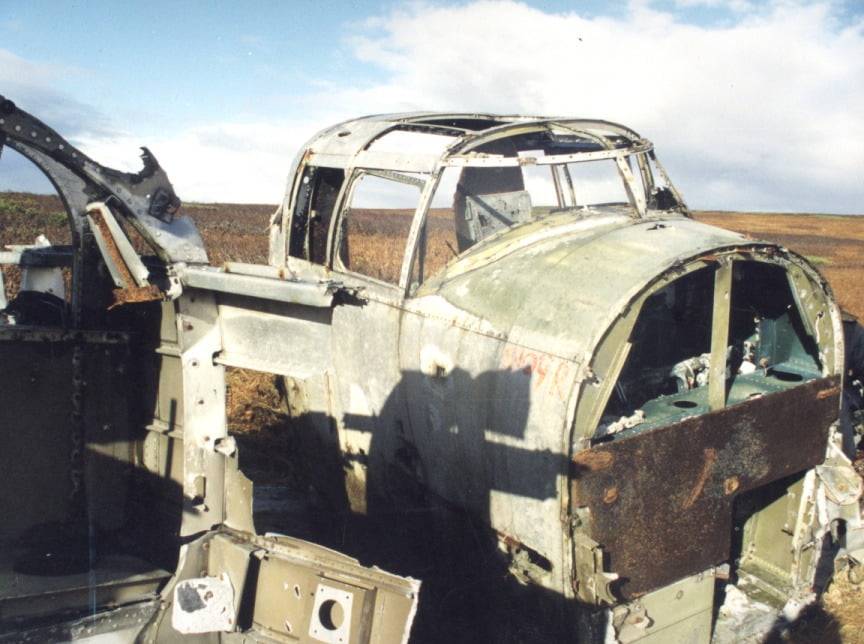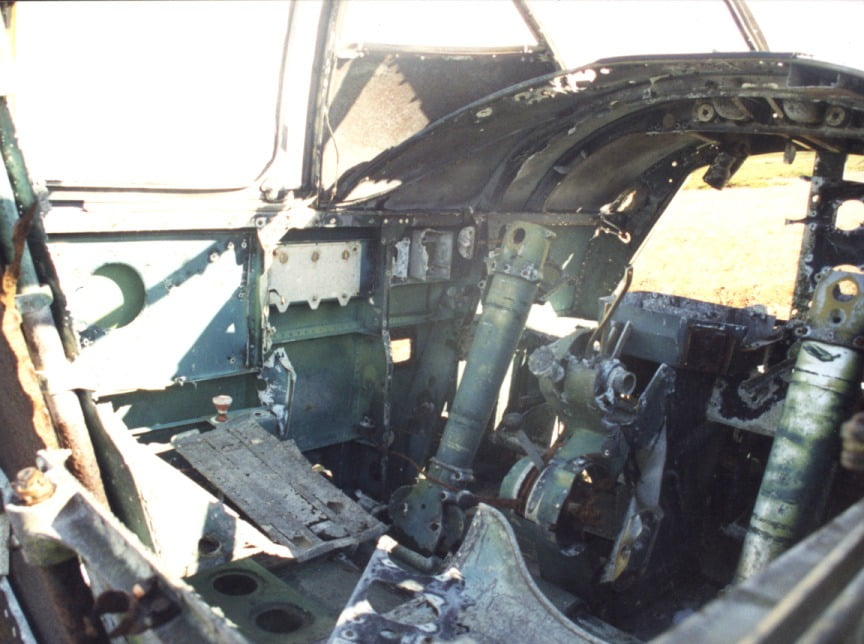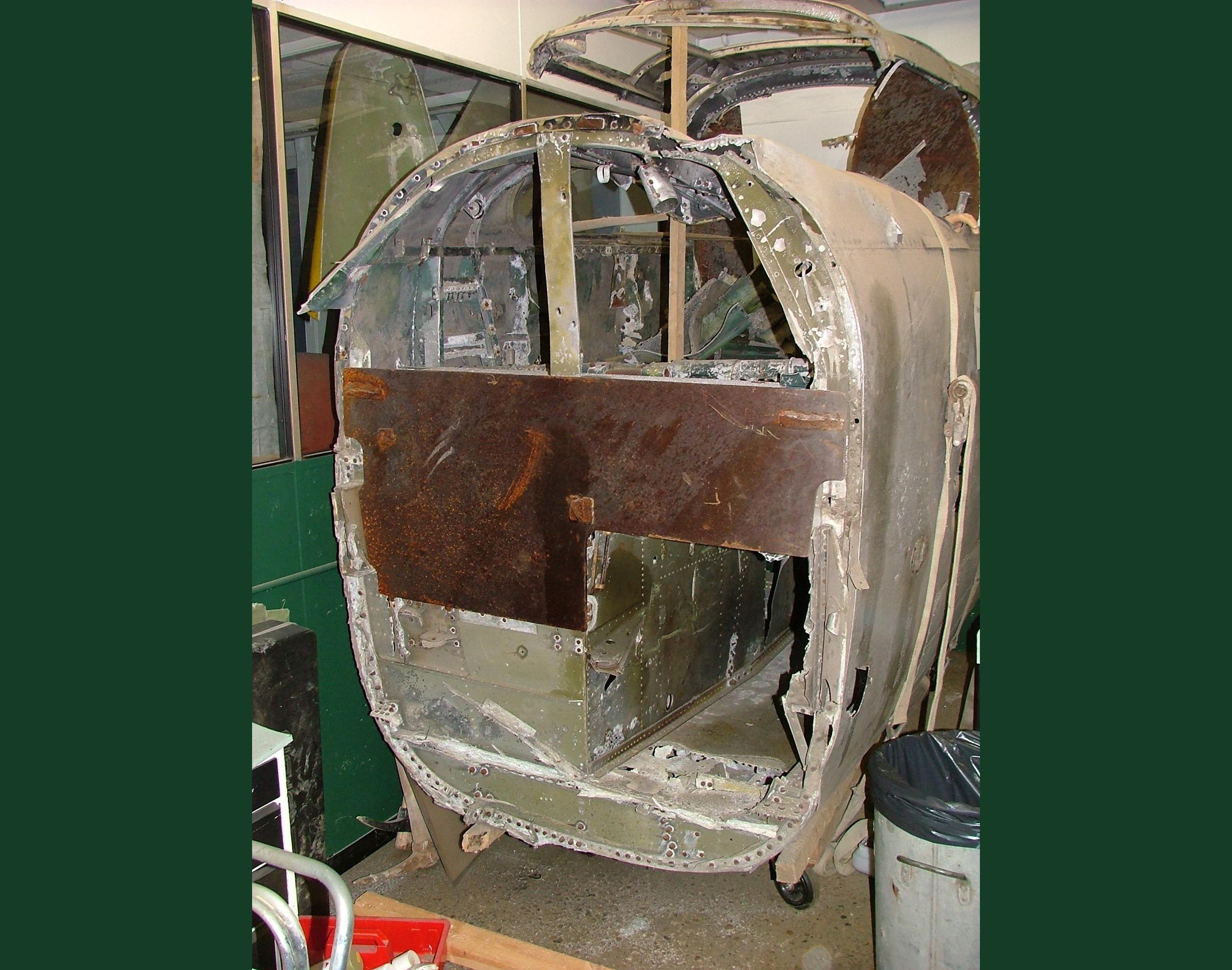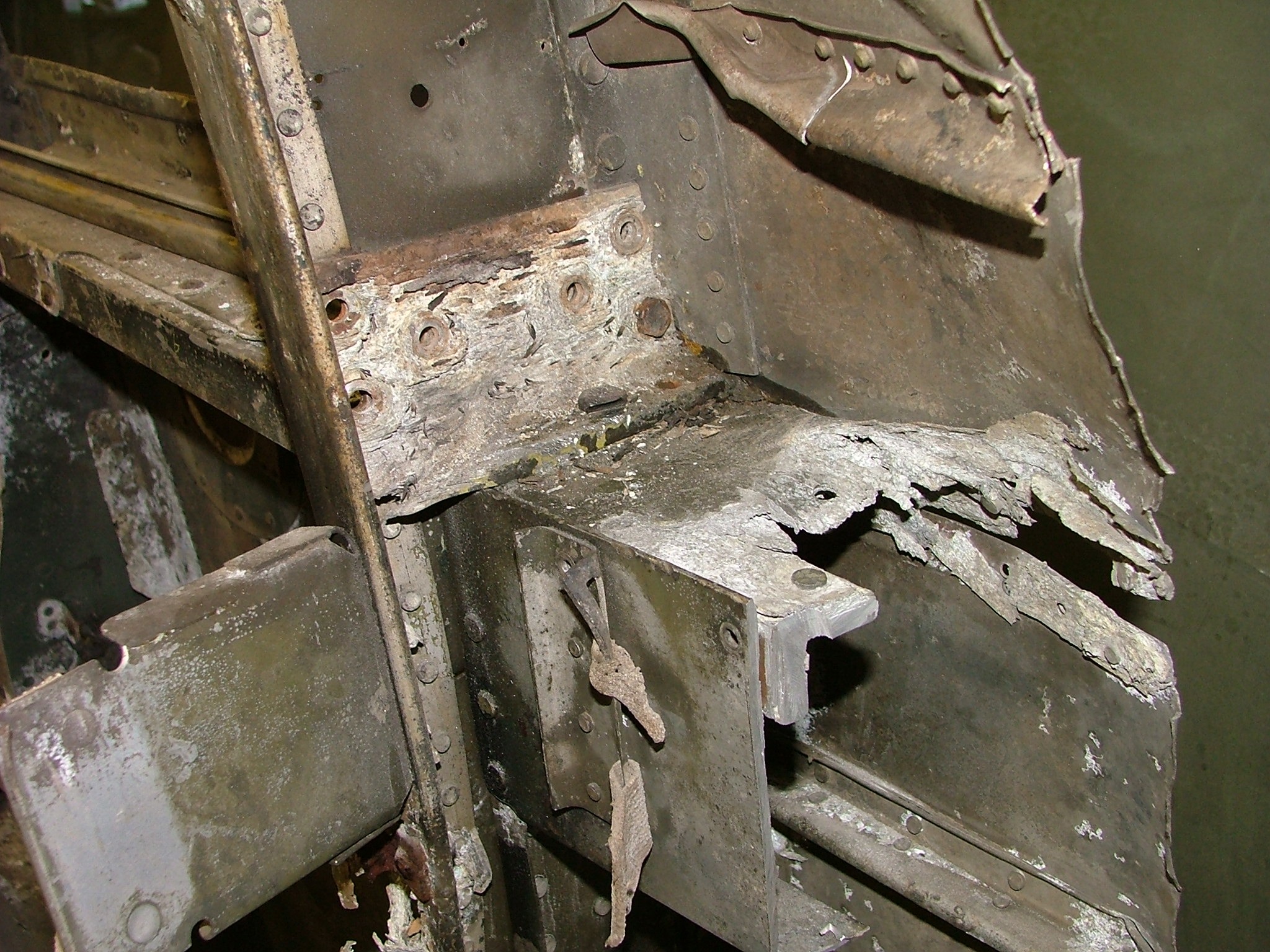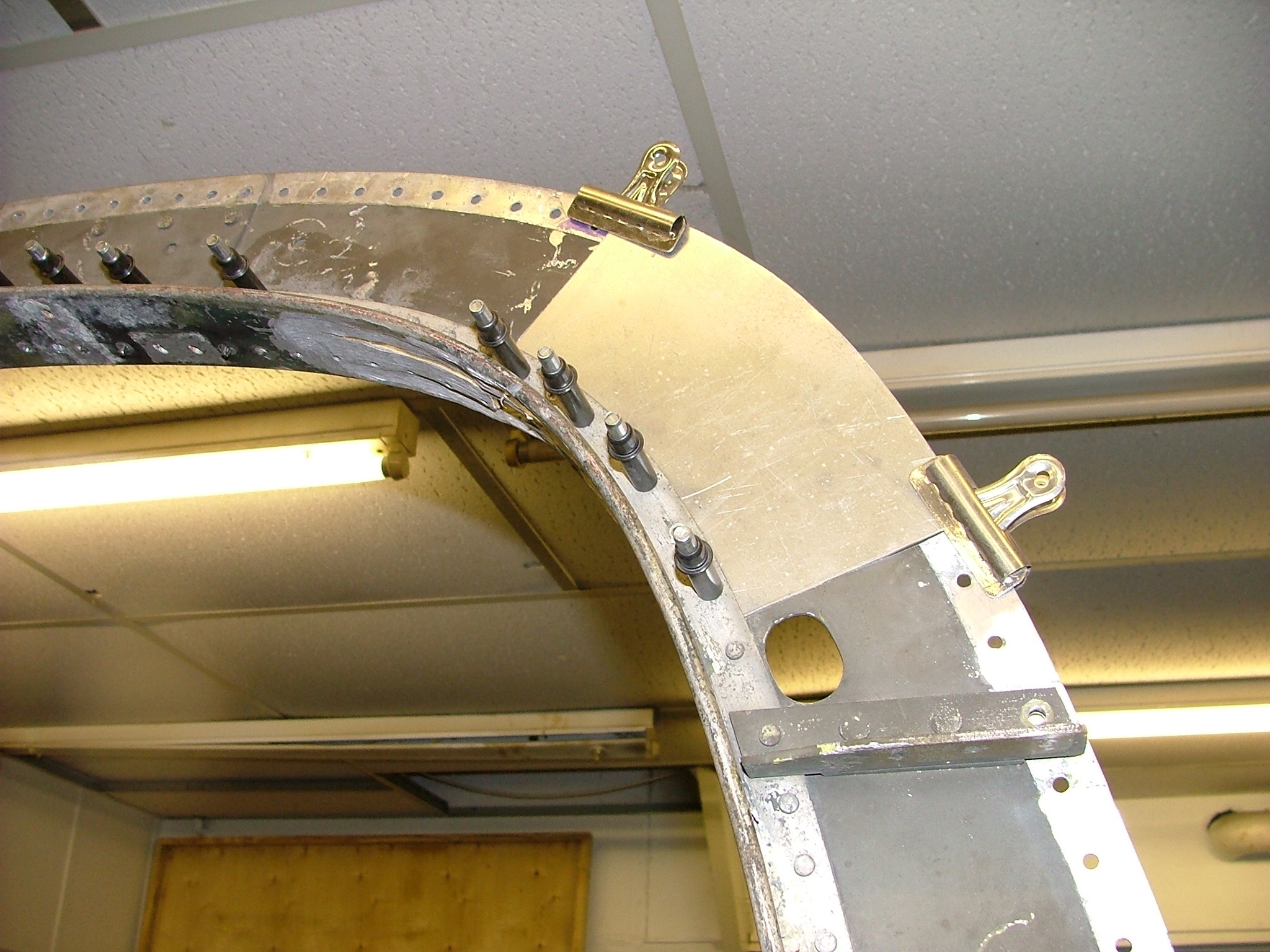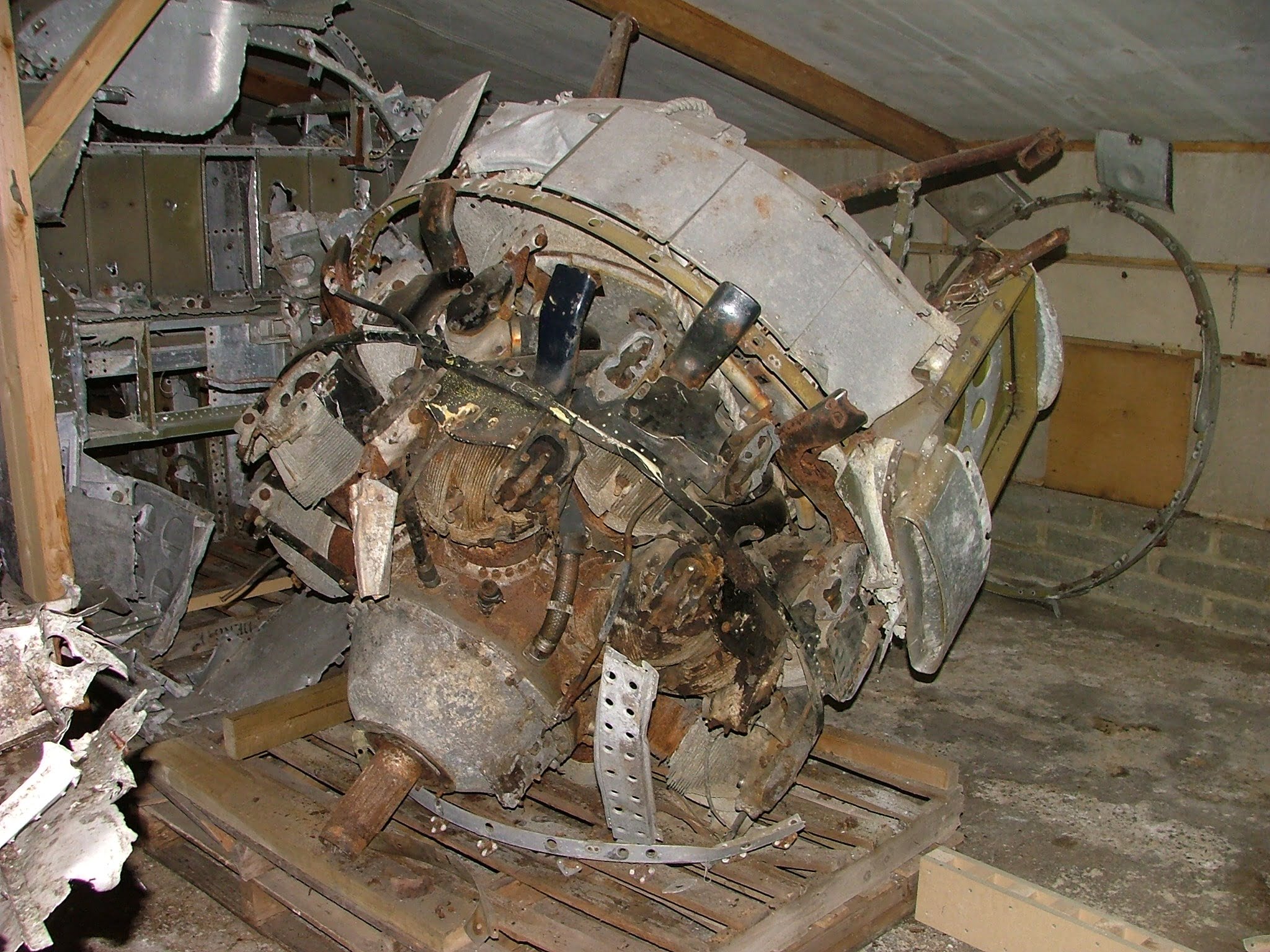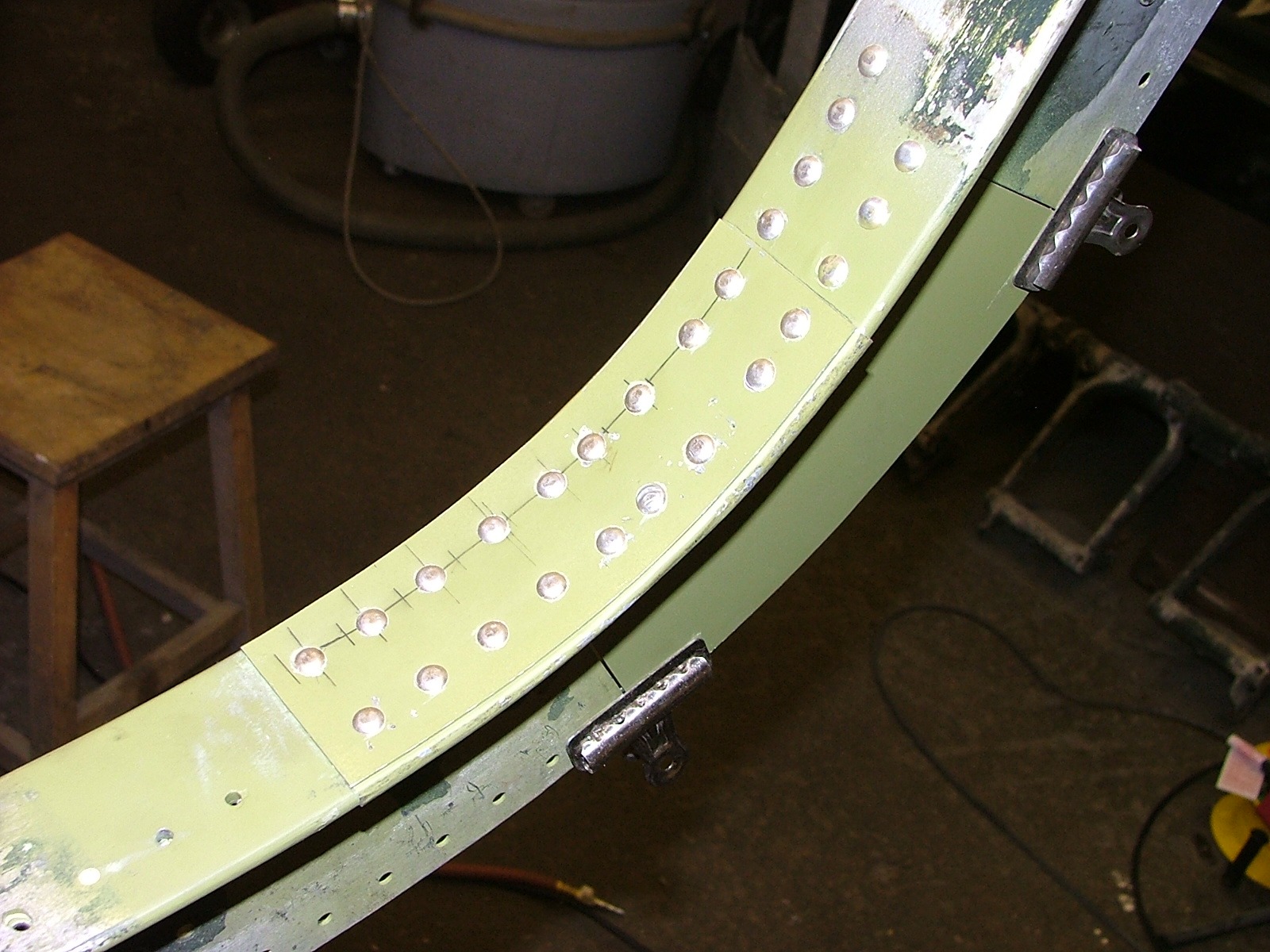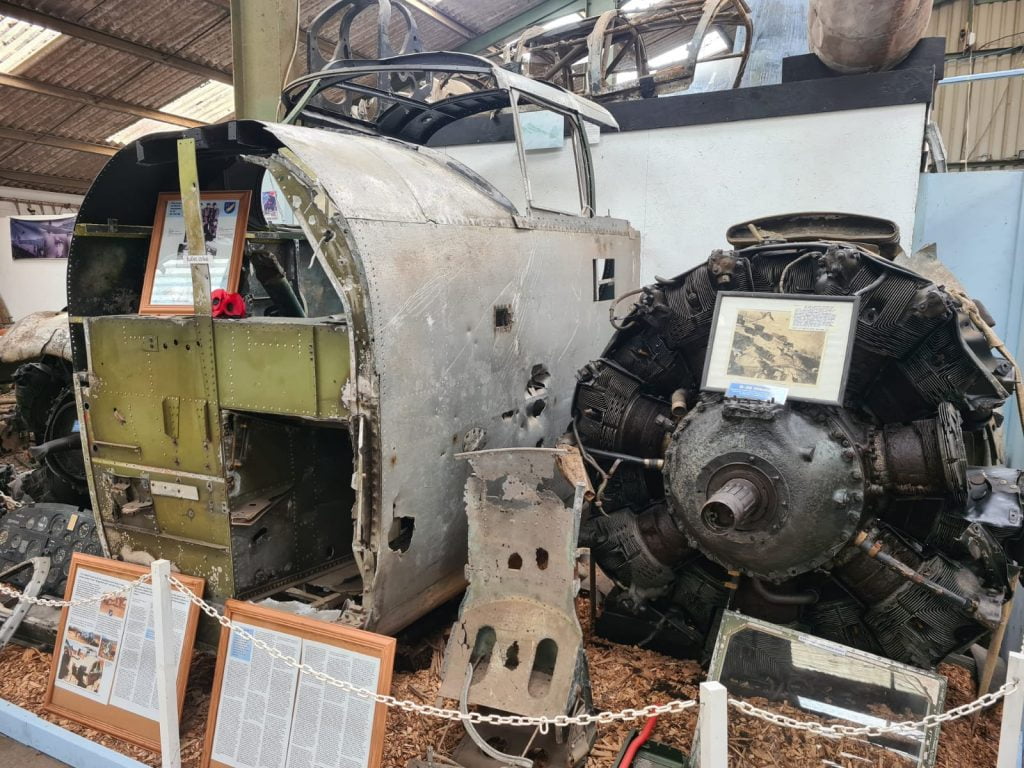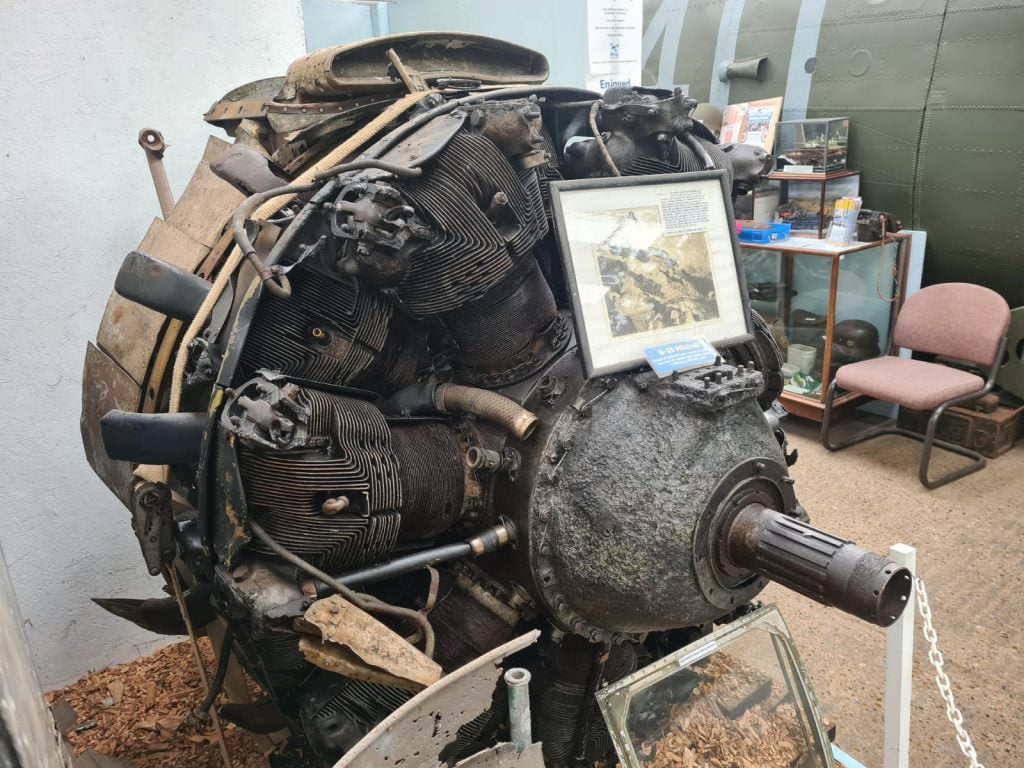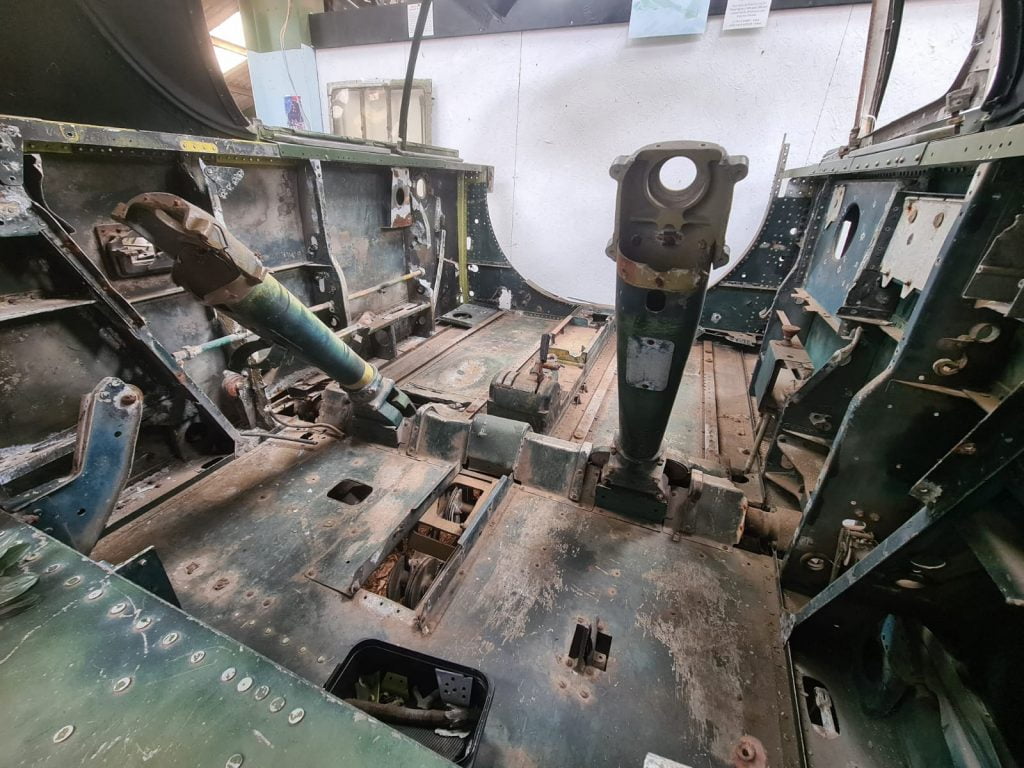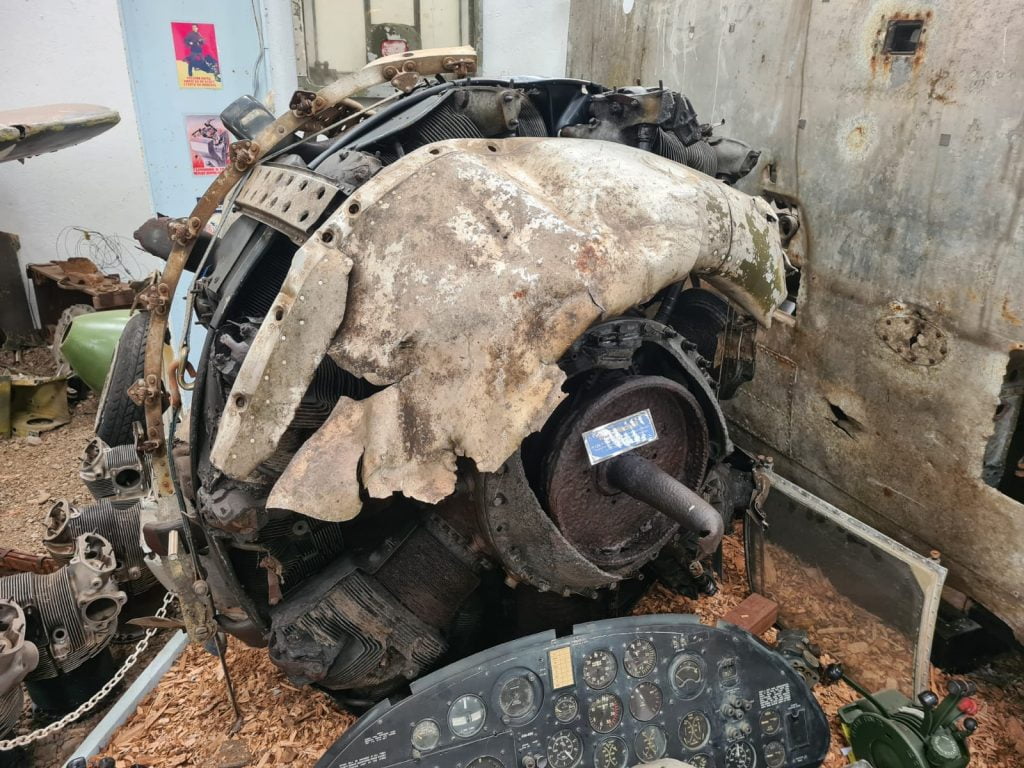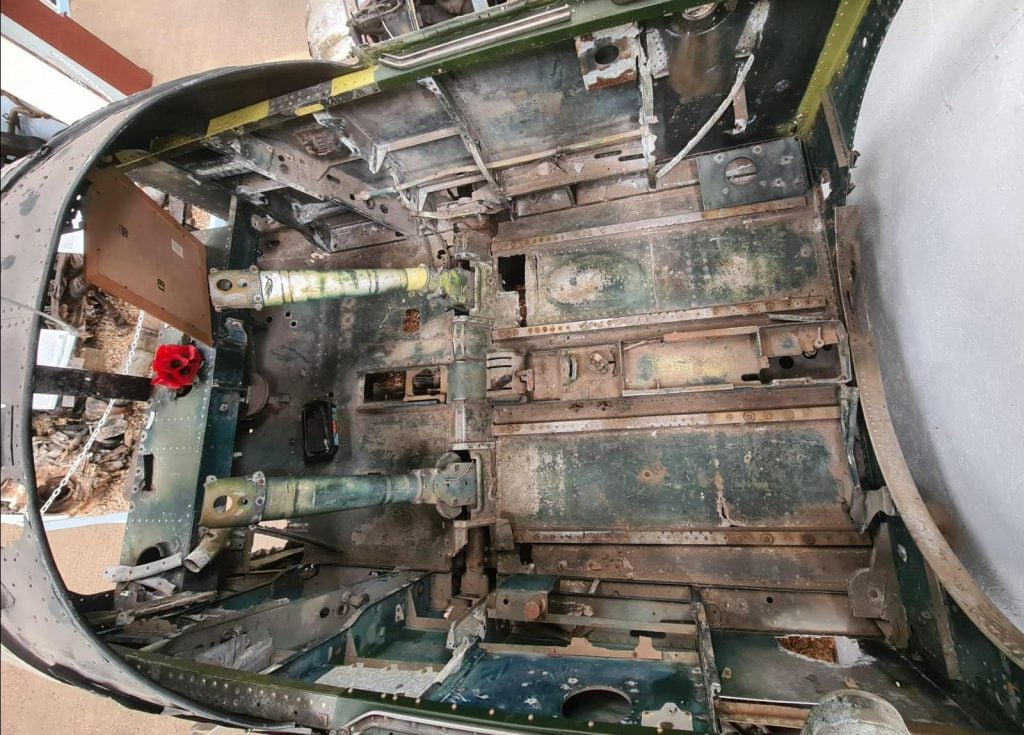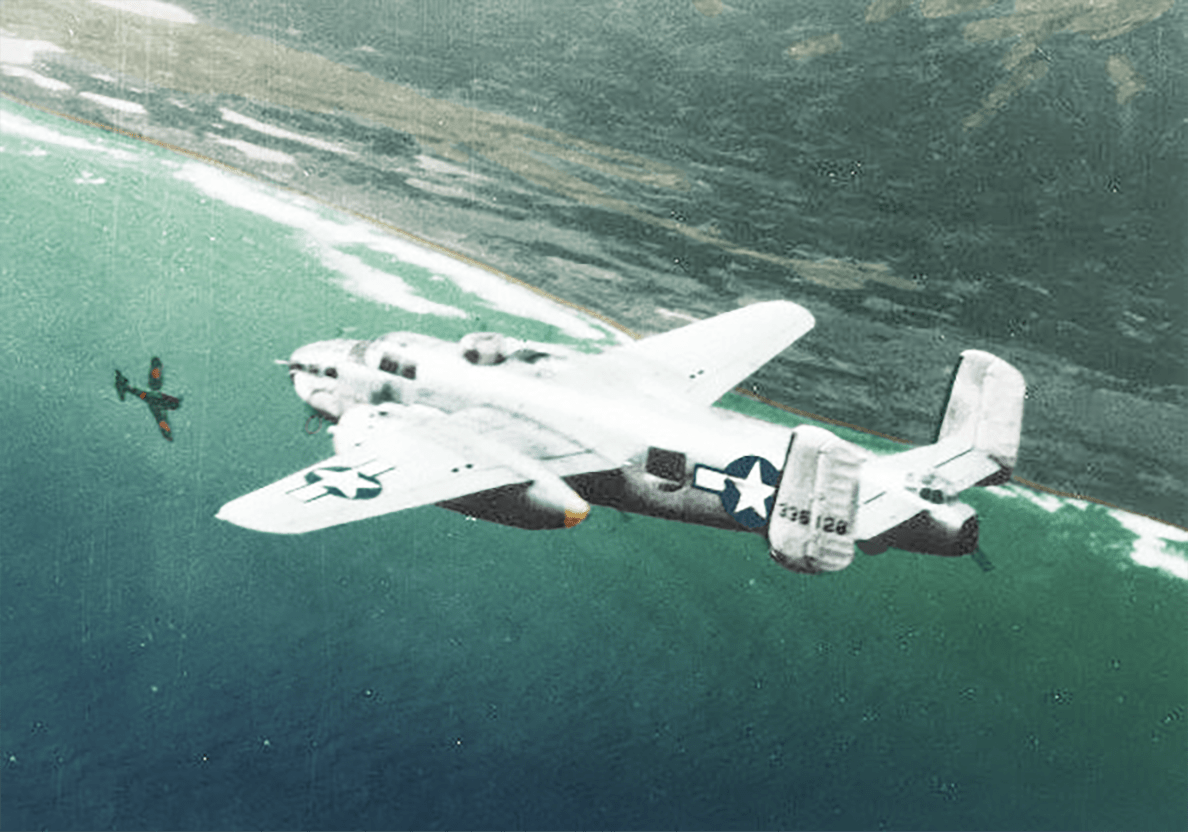
Recovered from the Kurile Chain of Islands in the North West Pacific.
The Cockpit section and two engines of a long forgotten World War Two Veteran B-25 Bomber have been returned to the Wings Museum in the UK for restoration to static display.
The remains of a long forgotten North American B-25 were recovered from Eastern Russia by brothers Daniel & Kevin Hunt. The forward cockpit section, rear main fuselage and both engines were airlifted by helicopter and later shipped to the UK. Due to the location of the B-25 it is believed that it was being operated by an American unit flying from Attu with the 11th US Army Air Force. Research is currently under way using the engine numbers as a form of identification. No evidence of any human remains were found at the site and all information was passed onto the American POW/MIA Personnel Office. It is hoped that the USAAF serial number together with information on the crew, squadron and its final mission can finally be tracked down and the story of this B-25 displayed along side the final museum exhibit.
The B-25 crash site
Artefacts and personal stories of the little known ‘Aleutian Campaign’ will also be displayed alongside the B-25 cockpit. This exhibition will be dedicated to both the ground and air battles that were flogged out in this hostile environment. The campaign climaxed with the invasion of Kiska which was carried out by a determined force of invading US Personnel who successfully pushed the Japanese Army back, thus preventing any further attempts of invading the United States of America. During World War Two the battles fought in the Aleutians were kept out of the public eye as the government feared that the people of America would begin to panic which would have had a diverse effect on the war effort.
The Restoration…
It is planned by the museum to carry out a sympathetic restoration on the main cockpit section saving as much of the original as possible. A general ‘tidy up’ will be undertaken and any structural damage particularly the canopy area being repaired and restored to its former glory. Any corrosion which is mainly limited to the under belly area due to years of laying in grass/scrub etc will be treated to prevent any further corrosion from occurring. Any work undertaken will hopefully retain its ‘recovered’ look with work being limited to basically making it a more attractive museum display. Once the first phase of airframe repairs and anti corrosion work has been undertaken, it is hoped to then move on to restoring the interior by replacing some of the missing cockpit fittings, including pilot & co pilots seats and even the main instrument panel. Any information on the whereabouts of parts to boost this project particularly a pair of early WW2 USAAF pilot & co-pilot seats & also a forward nose section would be most welcome.
B-25 Work in Progress
43-36140 On Display
The crew's incredible journey
Departed: Alexie Point on Attu
Date; – May 19,1945
The B-25 of 2nd Lt Milton Zack (Navigator Bomber) crashed after losing a propeller over Shumushu Island, the northernmost island of the Kurile chain which is very close to Kamchatka Penninsula and about midway between Attu and Hokkaido. The crew of six survived the crash. Japanese soldiers captured and beat the men “unmercifully” before taking them to a civilian jail.
After interogation at the Japanese Naval base at Paramushiro, Zack was flown to Hokkaido. (Story by Japanese pilot regarding HIS brother who was KIA in Malaya) Three of the crew, Lewis, Burrows (Picture of Lewis and Burrows) and Bradley, died on a Japanese ship (Tenryo Maru) that was torpedoed and sunk while taking them to mainland Japan. Bailey and Trant were transported to Sapporo on a separate ship that got through.
At the end of the war, Zack and some 12 other men were taken from various local jails and brought to Sapporo Camp. There were 12 other men already held in the camp. Here, he was reunited with his two other surviving crewmen.
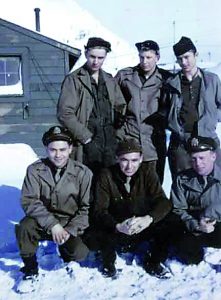
The Crew
L-R
Back Row:
Bailey, Walter – Armorer & tailgunner
Trant, Robert -Engineer & gunner
Bradley, William -Radioman & gunner
Front Row:
Zack, Milton – Navigator & Bombadier
Lewis, Raymond – Pilot
Burrows, Edward – Co-Pilot
Red – Died when transport ship (Tenryo Maru- 45.05.29) was torpedoed by an Allied submarine. NARA does not show these men in the Casualty Data base nor as POWS
Transcribed from audiotape
Walter Bailey, Sr., tail-gunner on Lewis crew; B-25 shot down over Shumushu, May 19 1945.
Walter Bailey, Sr.: (unintelligible)…North Carolina, where I still reside. To correspond with me; my address is: 4 Old Dallas Road, Dallas, North Carolina 28034. For those who may be doing research, my army serial number is 14133548.
Our crew was put together at the Greenville Army Air Force Base in Greenville, South Carolina. We stayed at Greenville and done our OTU training and left in December for Great Falls, Montana. When we arrived in Montana, we were issued our equipment that we were to take with us to Attu.
We were we permitted to stay in Great Falls until after Christmas. Sometime in January 1945, we left by plane for Anchorage, Alaska. When we arrived in Anchorage, we spent several days there until a plane could be made ready to fly us on to Attu. The date of arrival on Attu is unknown, but it had to be sometime in January.
Well sometime after we arrived in Attu, we were put on flying status. But before we went on a mission, we flew familiarization flights around the Attu and flew several missions back toward Anchorage. Our first three flights to the Kurile Islands were what you would call a “milk run.” We flew over the target, dropped our bombs and returned to the base in Attu.
On May the 10th, Japanese time, 1945, eight planes left Attu to bomb shipping in the straights of the Kurile Islands. We approached the Russian coast and then flew south in a cloud cover thinking that we would not be able to see the target. All of a sudden, I heard someone from our planes say, “Lord, look there in front of us!” I being in the tail section of the plane craned my head around as far as I could, and there in the straights, pulled up against a cliff, was a big cargo ship.
We proceeded to go down out of the clouds and made a direct run over the ship from stem to stern. Four planes were in the flight and all planes loaded their full load bombs on the ship. We were tail-end Charlie that day due to the fact that our right wing tank had failed to fall when the gas was used up in that tank. We went over the island and we were low down on the ground. I could see the telephone poles going by and all this time I was strafing the barracks area and several warehouses. I could see the ground fire coming up at us, but most of it was going over and above us so that none was likely to hit. When we completed going over the island, and coming back across the island, we approached by fighter planes on our left but none of them made any attempt to attack us. We got back into the cloud cover and continued on our way back to Attu.
During the next ten days, the weather was so bad that we could not fly a mission west. I had a dream, or you might say a premonition, that on the next flight our plane would be shot down but that we all would be survivors of the crash, but I also saw Russian soldiers watching the battle and I also dreamed that three members of our crew would not make it back home and that three would be successful in returning home.
On May the 20th, Japanese time, we took off from Attu with all the ammunition and bombs and gasoline we could on board the ship. It was a very risky take-off. The plane seemed to want to go down. There was a lot of vibration and we soon made enough height so we could level off and the plane began to function better…but on our way to the target when we had used enough gasoline to pump the fuel from the wing tanks into the main tank, our right tank again failed to fall. The pilot climbed up to about five thousand feet and put the plane into a steep dive and would pull out trying to get the wing tank to fall but he was not successful in doing so. We continued on to the target but we had to take tail end Charlie again since we were not able to keep up with the other three planes in the flight. We made the run on the target, which was a fish cannery on the beach cut out in the cliff. We were flying so low on the water that the plane had little room to maneuver. I called the pilot and ask him to pull up and said that we were too low on the water but about that time I heard a bang and water came through the plane and hit me in the back. The pilot pulled the stick back on the plane and it skipped off the water and gained about 400 feet. Going over the cliff, he dropped his bombs on the target and about 30 seconds later, we were on the ground. No one was hurt in the crash. The radio operator and I, being the sole members in the back of the plane, chopped the left hand side window out and climbed out on the wing and jumped down on the ground. We waited for three or four minutes before we saw the remaining crewmembers come out of the front of the plane onto the wing and jump down to where we were. The pilot had ejected all emergency equipment and we were ready to make our escape to Russia but the Japs put a fighter plane called a Zero over us and every attempt we made to go to the coast…the plane would make strafing runs at us. However, he never fired his guns. So we went out on the hill where the wind had rode the deep snow down close to the ground, and we all sat down and talked the situation over and decided what to do when the Japs came up to get us.
It took them about two hours to reach us because of the deep snow. The snow would average 8-12 feet deep. We saw them coming and had decided when they got up so close to us, we would stand up and put our hands. They were about 50 or 60 men in the Japanese squadron that came to get us. Most of them went to the plane but three men, two carrying guns, and one carrying a whistle, got on our tracks and tracked us out on the hill. Now they did not do a thing until we stood up and put up our hands. Then they began firing at us. I was so scared my knees buckled and I am sure that every man in our crew felt the same way I did. I felt like my time had come to depart this world but they stopped firing and motioned for us to start walking. A day or two later, they told us that when they were firing at us, they were not using live ammunition but blanks just to scare us. Now this was a good thing they done because we were all very much scared.
We were marched down to a barracks area; the barracks being underground. Before we arrived at the barracks area we came up a very narrow path in the snow and I being in front next to the Jap that was leading us, saw a sub-machinegun on a tripod with two Jap soldiers laying behind it with their fingers on the trigger. Now I died again. I was very, very scared that would be the very end but the soldiers that were with us, searched us and took everything we had, even taking our belts and our shoelaces, watches and everything that we had on us. But previous to their first finding us, we had decided to chew all our papers; private papers as well as planes papers. We chewed them up and spit them out to keep the Japs from finding them. Especially we wanted to protect the cove but the Japs on the ground with their fingers on the tripod of the gun did not fire a shot at us. Instead they marched on us out to the barracks area and there we were held for several hours with about every Jap on the island coming up to see us… to see what we looked like.
The officers soon left and as the officers, the Jap officers had left the area, the noncoms told the Japs to beat us up. Now they knew who the pilot was and the co-pilot right on down to the tail-gunner, I being the tail-gunner. They started with the pilot and they beat him till he could hardly stand up. I saw what appeared to be a deep gash on his cheekbone. That was on the right cheekbone with blood flowing freely from it. I saw the co-pilot and he was beat severely too, but the radioman …I could see a cut on his upper lip. It looked to me as if it was cut all the way through to his teeth. When they had satisfied themselves that they had beat us enough and the worst they done to me was to kick my shins. I could hardly stand up and I have the marks on shins today to show where they beat on me by kicking with hobnailed shoes. [Lt. Lewis, Pilot; Robert Burrows, co-pilot; Bradley, radioman]
They took us down in the barracks and the barracks consisted of two rows of bunks built on either side of a walkway down through the middle and every so far apart was charcoal burning stoves. It was warm in the barracks and they told us to lie down on the bunk and there was plenty of cover with which to make ourselves comfortable but none of us dared make any move toward doing this. We lay there and I can never believe would go to sleep under the conditions and circumstances but I did fall to sleep sometime during the night and I slept a very good nap. Sometime during the night a Jap soldier came in. He was probably drunk. It was hard to tell except by the way he walked. You couldn’t smell his breath because the odor in the barracks was something out of this world. Now as we lay there, he came down the aisle and he stumbled over my feet, which were sticking out in the aisle, and this made him very mad and he got me by the shirt collar and jerked me up off the cot and really worked me over. Then he shoved me back down on the platform that I call a bunk and went on his way. The next morning the interpreter and the guard came and got us and took us out of the barracks, blindfolded us and tied our hands behind us and proceeded to march us down to the coast.
When we arrived at the coast, which was about two and a half or three miles, we came upon a settlement. The houses being built out of mud and straw and I saw through my blindfold six rifles stacked up in front of one of the buildings. Well, I just knew this was the end because they had told us when they captured us that if we had killed anybody in the raid on the cannery that they would kill us. So I figure that our time had come again. But instead, they marched us on a few yards and as I could see through my blindfold, I saw a deep square hole dug in the ground and I figured that they had dug that as a grave and were going to shoot us and put us in that hole. But then this was not the case. They took the pilot first and had him get down in the hole and walk up to the end of the dugout and they placed a piece of board with his name and number on it against his chest and took his picture. They done this with each crewmember. I was the last man to have his picture made. After that I felt more at ease than I had since I been captured, because referring back to my dream, I figured that all would be well. So they marched us back to a jail cell, which was a two or three room jail. It had charcoal burning stoves, but no fire. It was cold…very, very cold. It was where we stayed until late at night, when they would come in and take three men at a time and march them into a village and interrogate us.
Now these interrogation trips came always after midnight. To this day, I can remember going into the room with a guard on each side and all the Jap officials sitting at a square…what we call a square table discussion room…with a chair sitting out in the middle for the prisoner to sit in while they interrogated him. Now I have never been able to find out or determine any questions that they asked me. I believe that they may have doped us so that they could get a confession, but I am not sure. I cannot remember answering any question other than giving my rank, name, and serial number. Then the interrogation stopped.
One night I decided that I was going to find out if the Japs really were going to kill us or if they were going allow us to live. I told the guard that I was sick and I would like to see a doctor. I told him I thought I had appendicitis. So, he sent for a doctor and he came very shortly to the room where I was incarcerated and he gave me a real good examination. I told him I thought I might have appendicitis or that I may have strained myself when we crashed. He took my temperature and the way they take the temperature in Japan is not by putting the thermometer in the mouth, but by putting it under your arm. So, when he handed me the thermometer, I put it in my mouth and all of the sudden he grabbed it and jerked it out of my mouth. He figured I was trying to commit suicide. So, he gave me aspirins. He said I had a little temperature and he gave me some aspirins to take and gave orders for the guard to give more aspirins the next morning. So I concluded from this visit by this doctor that they did not intend to kill us.
Now on the third day of capture, they came for the pilot, which was Lt. Lewis, for the co-pilot, Robert Burrows, and the radioman, Bradley. They would not bring them by for us to say goodbye but they took them out to sea and put them on a ship and formed a convoy, which was going down to the island of Hokaido. Now on the way down to Hokaido, the convoy was attacked by American submarines and the ship on which the three crewmembers were was hit and they went down with the ship. Now that is what the Japs told us what happened to them.
At this time I would like to digress a little bit and go back to the moments before we were shot down and especially the time that… on May the 10th, that we sank the ship I told you about at the front part of this tape. As we were coming back over the island, after we had struck our target, I looked down the channel and saw a large Japanese destroyer. All of a sudden, I saw four B-25s come down out of the clouds and they proceeded to attack the destroyer broadside. It seemed to me to be a very foolish thing. I could see the ship as it fired its guns at the four planes. The ship would roll over on its side and then as it leveled up again, they would fire again and I saw three B-25s go down and hit the water. There was usually an explosion and that was the end of the plane. One plane I saw headed for Russia. I don’t know whether he made the trip successful or not. I have not been able to find out who he was or whether they had to jump or whether they crashed their plane after they made it to the airport in Russia.
Now, the Japanese were very attentive to us. They would beckon to our every call. They always give us water when we asked for it. They fed us twice a day, a goodly portion of rice rolled into a ball and about the size of a baseball. We, Trent the engineer and I, and Lt Milton E. Zack, the navigator, were incarcerated in one cell of the jail. On about the tenth day of capture, they came for Lt Zack and took him away. We said our goodbyes and wished him well. We did not know what they were going to do with him or whether they were going to take him to Hokaido or whether they were going to kill him. The Japs told us that they put him on a fighter plane and flew him down to Hokaido to the city of Sapporo. The on the 13th day of capture, Private Trent and I were taken out to sea on a small boat and put aboard a small cargo ship. I was very much afraid that we would be attacked by American submarines, because I knew that the submarines were in that area. But we proceeded along at a very slow rate of speed. A good size convoy going down to the China Sea and down to the island Hokido at a small seashore town called (Tape stops.)
(Other side of tape) Japanese equivalent of our Red Cross met the train and Jap soldiers were being transported from point to point and they were giving out sweetbread to the soldier and other items of food. Our interpreter, that was with us, asked one of the girls to give us a piece of the sweetbread. So she gave Trent and I a goodly portion of sweetbread, which we started to eat, but before we could get a bite, a Jap soldier came up and took it away from us. It made me very mad but there was nothing that I could do about it. The interpreter didn’t say anything to the soldiers. Now, we proceeded on the train from Otori to Sapporo. When we arrived at the depot in Sapporo, people had heard that we were aboard the train and that we were going to get off the train and they were all over the place in order to get a view of the American prisoners.
We were taken to a public bath and there we were given the opportunity to take a bath and to have disinfectant sprayed on us to kill the bugs…the bed bugs and fleas. They did not have any vehicles to transport us from the depot to the civilian jail in Sapporo where we were to be incarcerated. We walked all they way. The interpreter walked in front then me and Trent and the two guards with guns behind us. When we arrived at the civilian jail, we were put in a cell about six feet by ten feet. The door that you had to go in to the cell was about three feet by three feet. So you had to get down on the floor and crawl in…you couldn’t stand up. All the sanitary facilities we had was a hole about a foot long and about eight inches wide cut through the floor with a bucket hanging underneath. At the top of the room was a small window that let in the light but I never saw sunlight. In the middle of the room overhead was a small electrical light with a very low wattage bulb. We had no bed. We had no comforts of any kind. We had to lay on the floor or either set up with our backs straight up against the wall. Now the Japs would come in, early in the morning…about four o’clock, and bring our breakfast, which consisted of a little rice, about two tablespoonfuls for each man, rolled in a little ball in their hands and poke through the bars in the door where each man could get his share.
About three or four days after Trent and I arrived in Sapporo, they brought Lt Zack in and placed him in the cell with us, which was certainly against all rules of the US army. He remained in this cell until the end of the war. We were fed twice a day, once at four o’clock in the morning and four o’clock in the afternoon. They never refused to give us water except one time; there was an air raid on that lasted about 18 hours and didn’t receive any water during that period of time. Neither did we see any guards or any Japanese people.
When they placed us in the cell they issued us a toothbrush and toothpowder, but they never allowed us to use it. They took our shoes. We were barefooted or in our socks. The bedbugs got so bad we were literally covered with sores from scratching from where these bedbugs would bite us.
One day they brought in a young boy, about 12 to 14 years old, and an old man, about 60 years old, that they told us had been stealing cabbage off the cabbage wagon. They brought them in and put in the same cell with us because they didn’t have any room in the other cells for them. This kid was the most miserable looking creature I had ever seen. He had mud from his toes to the top of his head and he laying on the floor next to me and I looked at him good and I could see fleas just literally crawling all over him. Just the same as you have seen them on a dog and I almost cried because we had not had any fleas before and if there is any insect that hate it is a flea because I can’t stand the bite. Lt Zack was sitting next to the old man and Lt Zack got the old man to give him some information by hand signals as to where the war was going on and he told us that the fleet was sitting off the coast of Japan and that they had raided had most of the towns and cities, knocked out the bridges, and other items of interest to the army.
During our stay in this civilian jail, we were taken out on two occasions to do work. One afternoon, they came in and asked us if we wanted to go and work some and we told them yes, so they brought us shoes and we went out in the courtyard and they had dug a huge hole in the ground, which they told us it was an air raid shelter. They had dug it down so deep…dug this hole by hand! They had no machinery to dig it with and when they got it down so deep, they figured that we were taller than them and that we could throw the dirt out of the hole better than they could. So they took us out there for one half a day and we cleaned the bottom of the hole and threw all the dirt out. So they put us back in the cell and we felt pretty good about it because it was a lot of exercise, even though our hands were bleeding from blisters caused by using the tools. Then the next day, in the afternoon, they came and got us again and told us they wanted us to throw all that dirt back on top …that they had framed the hole up with timber and wanted us to put the dirt back on top of it. So we went out and we worked and we worked. After a couple of hours the interpreter sent the guard to get us some water and some food. The guard came back and he had a jug of water and he some hardtack biscuits and he gave us that and told us to sit down and eat and rest. So we did.
I saw the sergeant that was charge of us and the captain that was in charge…they had been horseback riding, and being from the farm, I was admiring the horses. I got up off of the ground and was standing up. The sergeant rode the horse on up to the stable and I didn’t see him come around the picket fence, but about that time Trent and Zack yelled out, “Bailey hit the ground!” So I hit the ground and I heard the sergeant pull his sword from its sheath and he apparently took a swing at me. I cannot swear that he did but it like to scare me to death. I thought he was going to cut my head off. I had a long handled shovel and I told myself, I said, “If he comes at me with that sword, I going to split his brains out with this long-handled shovel because I got the reach on him even though they’ll kill me for killing him, I going to take him with me.” He motioned for me to get up off of the ground, so I got up off of the ground and he just motioned for me to start shoveling. We all three started shoveling right fast. We finished covering up the air raid shelter and they took us back into the cell. That was the only time we had ever been allowed outside the cell.
Lying in the cell, there was window in the hall and we could see out in the courtyard and every morning the Japanese had some kind of a ritual they went through. They would face Tokyo and the emperor, his palace, and say some kind of a prayer.
One day the guards all left and I heard a lot of hollering and commands outside and the people lining up out there and they acted like they were scared to death. We didn’t know what had happened. We didn’t know whether the Americans had invaded the islands or just what had happened. It went on maybe a day or two; I don’t know how long it was between the dropping of the first atomic bomb and the dropping of the second. They gathered out in the courtyard again and they looked very sad and was bowing towards the emperors palace and we figured something big had taken place. Personally I knew the Americans was working on something…some kind of a secret, I knew that because I lived in North Carolina close to Oak Ridge, Tennessee. I knew from town talk that something big was going on, but then I didn’t know they had dropped the bomb until the interpreter came in and asked Lt Zack…Lt Zack was a pharmacist in his civilian life…and they come in and asked him what to do for certain types of burns. I don’t know what Lt Zack told him, but I know he told them something and they went on their way. It went on for a goodly time and we didn’t know what to think. We just held our own and prayed the best would come of it.
One day, it was late in the afternoon as it was getting dark, they came in and bought our shoes to us and they told us to put our shoes on. They brought our jackets…they had our flying jackets…they opened the cell door and told us to go with them. We crawled out the hole and we were so weak we couldn’t hardly walk. We had lost so much weight. We managed to walk out in the street and they had a Ford truck out there with a flatbed on it and they told us to get up in the truck. I tried to get in the truck but I couldn’t. I was so weak that I couldn’t get up in the truck and the Japs saw that so they come and picked us up into the truck. As soon as we got up in the truck they told us the war was over. Lt Zack, Trent and myself, we started crying and hugging each other and we were so glad that it was over.
They carried us out to Hokaido University. When they got us out to the university, there were other guys there that they had had incarcerated throughout the city of Sapporo. When the bought us together, there was 25 of us all together. Our commanding officer was a fighter pilot from out of China that was a Lt Col. [Quigley, Donald L.,Lt Col] So he got together with the Japanese Colonel and they brought us out food everyday. About ten o’clock in the day, the truck would come out with food. They would have a milk can full of milk and they would have potatoes and rice and sake and whiskey and beer. They brought along some charcoal burners and some pots and pans and we were able to fry our potatoes and had plenty to eat. We were well contented because we knew it wouldn’t be long till the American army would come in and get us.
But never the less, the Japs started treating us pretty good and they took us on a tour of the town in a bus and carried us out to a state farm where we saw a herd of sheep. I remember seeing this bull out there. He was a white-faced bull and you could tell by looking at him that he was several years old. The oldest looking animal I believe I had ever seen, but he was a big one and he was just as fat as he could be. I thought to myself how I’d like to have a steak out of that bull.
We were sitting in the area where we slept at the university there. They slept on tables and had blankets to lay on and blankets to cover up with and even in July and August, it was very cold to me. I don’t know if it was because I hadn’t had anything to eat and my circulation was so poor, but I stayed cold all the time. The mosquitoes were real bad. They didn’t have any screens on the windows or anything and the mosquitoes were about to eat us up. We all laid down there one night…it must have been 10 or 11 o’clock at night…and Lt Zack was sitting up on the side of his bed and he was fighting mosquitoes.
All at once, we heard gunfire, and everybody rolled off of the bunk and got down under the bunk. When we got the light on, Lt Zack said, “A man was shooting at me…I felt the bullet go by my head.” Sure enough, it had only missed his head by four or five inches and went on across the room and embedded in the wall. I believe that they dug the bullet out of the wall and never done anything about it because they never did catch the man that done the shooting. Our Colonel in charge got with the Japanese Colonel and told him to put an armed guard around the barracks we were in. So, he did and we didn’t have any more trouble as long as we were there.
When the Americans came in to get us, they carried us out to the airport and they had C-47 and they was putting stretcher cases on first and they put other guys on last. When we started to take-off, the plane just barely made it off and was headed into a pine thicket. I said, “Lord have mercy…we made it this far and now were going get killed trying to get home.” The crew that was on the plane knew exactly what to do. They had put too many stretchers in the back end of the plane and the pilot couldn’t get it trim…couldn’t get the plane trimmed enough to level off and it was just going down. We pulled a lot of those stretchers up to the front end of the plane and the pilot made it all right and he carried us down to Tokyo. When we got down to Tokyo he flew over the civilian area where it had been burned up. I didn’t see anything except desolation. Everything was burned up. The main part of the town was intact and it looked like the bridges and the roads were in good condition because I understand that Gen MacArthur had told the pilots of the planes not to tear the town up. They didn’t want it tore up. They didn’t want to build bridges and other things like that.
So when we go to Tokyo, they took us in this building. Trent and Lt Zack had departed and I had told them goodbye and I never saw them again and I haven’t seen them since. Since we was in the barracks at the Hokaido University. As I was saying, we got to Tokyo and they took us in this building and had us pull all of our clothes off. They didn’t allow us to get a bath but they took and powdered us with some kind of disinfectant and gave us clean clothes to put on. We felt much better after that. Then we got on board a B-24 and flew down to Okinawa. We stopped in Okinawa …I guess they refueled there at Okinawa…and then we flew from Okinawa down to Manila in the Philippines.
While I was staying there at a re-distribution center south of Manila, guys were coming and going all the time. Some were going home and some going to Australia for a rest period to get fattened up before they got back home. They didn’t want the home folks to see them in such bad condition. One night, I had been hunting for this boy from my hometown that was captured on Bataan and I had not been able to locate him. One night I was out at a beer party and I was talking to this guy who was a captain on Bataan and I asked him if he knew a certain guy. He said, “Yes, I know him…I know right where he’s at.” So I asked him if he wouldn’t mind going and getting him and bringing him down here because I wanted to see him as we went to high school together. He went up and got the guy and brought him down. His name was…he was Sgt Ray Buchanan from Bakersville, North Carolina. First thing he done, he come up and grab me by his hand and gave me a hug and he said, “What are you doing over here?” I told him, ” I got caught trying to get you out.” He had been there for four, four and a half years.
Several days later, I was put on a ship. Mostly Englishmen was on it and we were supposed to go to Seattle, Washington and the British guys were to go through Canada and go on back to England. But we run into a storm while we were going to the Hawaiian Islands and the air condition system went out down in the hold. It was very bad down there. You couldn’t sleep and you sweat. It was very uncomfortable. When we got to Pearl Harbor, we docked there, but they wouldn’t let us go ashore. They got parts and people that could fix the air conditioner and got them fixed. We then proceeded on to San Francisco. We didn’t go to Seattle but we went to San Francisco and we went to Lettermen General Hospital. We stayed there two or three weeks until we got processed and put on a hospital train. I came to Moore General Hospital at Black Mountain, North Carolina and I stayed there until March 31st, 1945 to 1946, when I was discharged. That ended my tour of duty and the experiences that I had during the war.
I am now sorry to report to you that I have been affected very much by the experiences that I have had over there. My nerves are shot. I have ulcerated stomachs due to doing that food. I have frozen feet and hands. I have to take so much medicine that sometimes it hard for me to stay awake. The medicine tends to put me to sleep. I retired when I was 62 years old and went on social security. I never lost a days work. I got my real estate license and since 1976, I have been in the real estate business and I have not missed more than two or three days of work since then. So to you who may the opportunity to hear this tape, I wish you the very best of luck. I hope that you will understand the mistakes that I have made while doing this tape. It has been a pleasure for me to do it but I get excited sometimes and I just can’t keep my train of thought going like it should. So, goodbye and good luck to you all.
One more I would like to say before I finally close out this tape. Lt Zack returned to his home in Massachusetts. He and I have corresponded very often and we talk to each other on the telephone. We tried to locate Private Trent several times but we were never able to locate him until Lt Zack entered the hospital and had bypass surgery. While he was recovering he made a last ditch effort to contact Private Trent who lived in Texas. So he called the town hall in the town where Trent lived and the lady there was kind enough to take the telephone book and lookup a number for a Trent that was listed in the book. She gave that to Lt Zack and he called the man and the man said he knew him and that they were cousins. He said that Private Trent was killed in an automobile accident about 30 years ago. So that ends the story. Lt Zack and I are left alone to tell the story.
